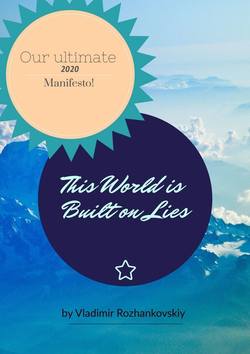Читать книгу This World is Built on Lies - Vladimir Rojankovski - Страница 7
End of the Cold War was a Time of Hope and Opportunity
ОглавлениеIn the last 30 years, naivety has been one single most important factor of the failed multicultural dialogue and the ruined careers of the internationalists. After the fall of the Iron Curtain under Mikhail Gorbachev and Ronald Reagan, one of the first post-Cold-War “liberated” air flights from Moscow to New York in 1989 felt like some sort of an action movie: memorably, Irish Shannon Airport pilots and employees decided to form a sort of lineup applauding us as we went out to the transfer zone. It seemed to many that a wonderful fascinating road to the New Tops of Civilization was ahead of us all. Indeed, Russia had vast territory and natural resources, as well as military and medical technologies, and Europe had the best industrial technologies, which neither Russia nor China possessed back then. The U.S., which enjoyed, in various proportions, all of the above, took the path of rapid development of financial and investment technologies that were complementary to the status of the dollar as the world’s reserve currency. It would seem that a perfect macroeconomic shape was emerging: natural resources and heavy industrial technologies of Russia, Ukraine, Kazakhstan and some other countries of the former USSR should have given impetus to the acceleration of industrial technologies in Europe, investments into which could be provided only by the USA with its powerful financial sector. The industrial revolution in China, in turn, brought a large number of inexpensive workers, who even without technology transfer, eyeing huge deferred demand for change and urbanization in this country, were ready to reduce the cost of the second technological breakthrough in Europe.
In reality, we have the following picture for 2020. Apart from the known “side effects” of the chronic monetary expansion (money printing by the world’s largest central banks) which led to slower growth and dwindling personal savings, Europe so far has never launched an independent space exploration expedition (although it was very close to it at the turn of the new millennium), and the automotive industry has unexpectedly moved away from its long time adherence to higher power and speed giving way to energy-saving technologies. Investments are stagnating due to the lack of new markets due to mutual sanctions and low returns on investment. As a result of the financial crisis of 2008, the United States locked up its financial and investment technologies to itself, while downplaying accelerating downfall of the manufacturing sector. At the same time, China has obtained not only the offshore assembly facilities it hoped for under best-case scenario, but also – as a surprise gift – technology, which allowed it to build its own powerful industry, including an ultra high-speed railroad network and aircraft manufacturing. Russia froze exploration and production of new minerals and energy resources due to the lack of foreign markets and switched to the model of import substitution and preservation of technologies received from the West during another “thaw” from 1991 to 2006. Should we look for the party to blame here, and doesn’t it make more sense to just reverse this detrimental process?
At least once in my life I felt like more than winning a lottery. In 1996 I was selected to participate in a Russia – United Kingdom government financial education and work program entitled The Chancellor’s Financial Sector scheme. A London city job was part of an innovative scheme to assist the former Soviet Union in its transition to a free market economy – something that eventually yielded mixed results: although today certain sectors of Russia’s economy, particularly, retail, largely comply with free market principles, lack of freedom for entrepreneurs – suggests Russia is still mainly a State-controlled highly centralized economy.
To say it was hard to get selected by the British Council by passing all the course work and arduous exams is to say nothing. Imagine a student whose English teachers have never been in a single English-speaking country and whose skills came solely from language classes conducted by the same kind of teachers who had never crossed a USSR border due to the iron curtain regime. How about preparing and passing the IELTS tests followed by a no-gimmicks pre-selection interviews with ‘real UK bankers’ (that was our real lifetime experience back then!)? It really felt like Alice in Wonderland: learning self presentation skills (Soviet schools discouraged students from standing out of the crowd for “ethical reason”), sticking to polite but assertive attitudes, setting up pronounced goals and prognoses, developing patience and respect, always remembering to add “please” and many more. It sounds funny now, but back then it really wasn’t.
I went to a final interview with a lot of enthusiasm but very limited English linguistic capacity and funny quasi-American accent caught during my recent trip to New York. Reading my first books in English gifted to me by my aunt living in Englewood Cliffs, NJ, I drew quite an interesting conclusion: the hard rock music was more ear-pleasing with the soft British accents (that’s why, I thought to myself, most rock stars such as Mick Jagger, Elton John, David Bowie, Robert Plant, Ian Gillan and many others were originally from England), but to study English the American accent was easier for listening since it didn’t swallow suffixes.
